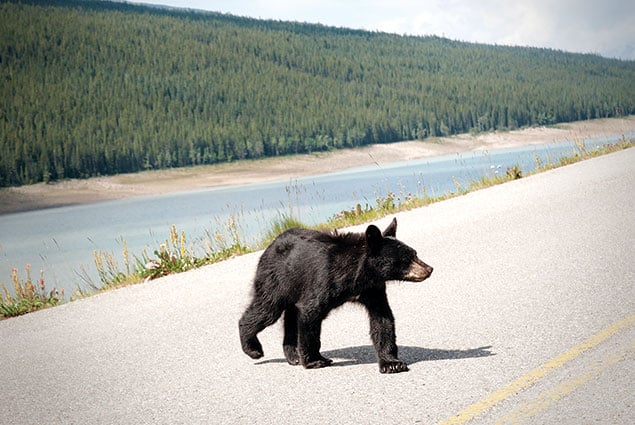I was power-walking with my friend Laurie on an asphalt bike path in Arlington that runs under the bridges of roads and highways and sneaks behind a neighborhood of ramblers and Cape Cods. In a flash, I heard a loud boom at the same moment that a tall shadow appeared in our path from something large rising behind us. In that split second, I grabbed Laurie’s arm with both hands and thought in fear: A bear!
This is not the typical first thought of someone who grew up in Center City Philadelphia in a high-rise apartment, took the subway to school, never saw a waterfall or the Milky Way until college, and has lived and worked in and around the power places of Washington for more than 20 years.
My thought was not “mugger” or “rapist” or “crazy person” or “traffic accident” or even “construction.” It certainly wasn’t “truck passing by on the highway above us”—as turned out to be the case. We were probably about 25 miles from the nearest black bear, with no possibility of grizzlies, in an area with a population density of 8,300 people per square mile.
But given that I’d spent the previous two decades day-tripping in the rolling hills and split-rail-fence towns of rural Virginia, had passed the previous year renting a weekend cabin in a hollow of the Blue Ridge Mountains, and had just come from a weekend there, where I encountered Ursus americanus while hiking in Shenandoah National Park, it was a reasonable mistake—though still odd.
In my experience, bears don’t generally react to humans by rising up on hind legs and making loud noises. In all the times I’ve come upon them—single bears; small, medium, or large; or mothers with cubs—most have immediately sprinted away in the opposite direction, in silence.
For 20 years, my outdoorsy, anti-city husband has been teaching this urbanite the ways of country, backwoods life: how to build a fire in a finicky wood stove, how to contain my Yankee impatience, what scat indicates about wildlife nearby, how to do without and make do, how to find company with the stars and sky, ferns and frogs. Over our entire marriage, we’ve spent more weekends and vacations hiking, backpacking, car-camping, or cabining than we have hanging out in any city or suburb; more days hoofing it up a trail than in the marble halls of museums or dark caverns of theaters; more nights in long johns than in black tie.
I may not have noticed along the way, but all the years of my “education” have become the preponderance of my life experience. They’ve seeped into my skin and my blood, shaped my values. I have, because of all of it, become imbued with new instincts.
When I thought I was about to be attacked by a bear in the middle of one of the nation’s largest metropolitan regions, I didn’t run and I didn’t scream. I knew that bears sometimes like to stand and sniff a person who has ranged into their territory and then, if they don’t immediately run away, usually get back down on all fours and continue digging for grubs or eating berries.
Perhaps that moment of panic was my subconscious rising from the well of my gut, confronting me with what I hadn’t yet truly understood.
I was a city girl no more.
Sue Eisenfeld is author of the book “Shenandoah: A Story of Conservation and Betrayal,” forthcoming in February. Her website is sueeisenfeld.com. This article appears in the November 2014 issue of Washingtonian.

















